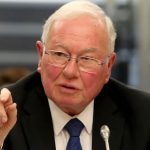Beyond Federation: An educational and informative multi-question plebiscite?
Why should the public only be questioned on the one topic of same sex marriage, if we could cover a whole range of issues at the same time? Klaas Woldring can’t think of a more direct form of democracy.
The Turnbull Government has decided to hold a plebiscite on the same sex marriage issue soon after the next election. Leaving aside the question why Australia has to wait any longer on this issue a separate consideration is why a very large sum of money would have to be spent only on that one issue.
But if it should go ahead, and that looks likely, the plebiscite could also be used to gauge public opinion on a series of other, very important issues. One could think of altogether 15 issues that could be tested in this way, and why not?
The response would inform the Government of the day in which direction it should move. Following the indecision that holds the Turnbull government back, and the difficulty about taxation options and budget, it could be particularly helpful if the voters express views on these in a plebiscite.
Surely one could hardly think of a more direct form of democracy. Democracy would take on a new meaning as the word consultation is indeed worthy of being used in that context. Equally important would be that the low esteem in which the Government and the parliamentarians are held, would grow again. Especially, if they acted on popular advice provided.
The sensible strategy to prepare voters for a meaningful multi-purpose plebiscite was followed by Dr. Bede Harris of Charles Sturt University for a survey on constitution and political system issues he conducted in 2014.
He asked questions on several issues related to the Constitution, Federation, electoral systems and the Republic AFTER providing adequate background material. He also provided opportunity not to answer a question if the voter felt s/he was not sufficiently qualified to respond. This is an important option as it enhances the quality and accuracy of the responses overall. Apart from the same sex marriage question several other issues could be the following:
Does Australia want to battle on with an archaic Constitution that may have made sense in 1901 but is now no longer appropriate for a vastly changed Australian society? If not, what strategy should be followed to renew or rewrite or replace the Constitution (say, three to five options suggested, plus “Other”)? Is the electoral system in need of a major overhaul? If so, what alternative would you (the citizen) favour? (say, three to five options suggested). Contrary to the usual claims that Australia is a democracy the electoral system results simply don’t suggest that at all. Such issues require urgent debate and resolution. Many would argue that this is in fact the most important first step. One related other question could be: Should the States still have equal representation in the Senate, an outrageous distortion of democracy really? Needed very much in 1901, to cement the federal bargain, but not now! The powerful position of the States to block constitutional amendments is another such crazy barrier in the way of renewal.
A further major issue is of course the federal-states conundrum, right now the subject of another clearly futile Inquiry. Should Australia continue with the costly duplication and ineffectual piecemeal tinkering associated with the federation? Some scholars and politicians argue that they could “make the federation work”, ”repair it”, “rescue it” etc. but these are yesterday’s failed solutions. Australia cannot turn the clock back, but that is what we hear from conservatives. Instead, we need a flexible, non-federal, forward-looking Constitution, which facilitates effective decentralisation. So how would voters go about suggesting a pathway to generate a model? Here again a number of options should be provided. In all these cases the media could assist greatly with publicising the educational material pertaining to the questions.
Another idea that the PM could put to the people first in such a plebiscite is the reactionary idea of returning some Income taxing powers back to the States. It is hard to believe that such a reactionary move, turning the clock back really, could even be entertained. There are many large companies tax that are avoiding paying tax. Surely if there is a budget crisis that is not going to be solved by decentralising Income tax powers. This is abandoning national responsibility. The answer here is end federation and introduce a system of decentralisation to boost the powers of local government. Australia is badly in need of a new electoral system that ensures that we get competent people in our national parliament. This is demonstrably not the case now.
With the revival of the Republic issue the question of what kind of republic? may well be foremost in people’s mind. This is not just a question about who should elect the symbolic President: the people or the politicians? There are several options here as well. The above major issues would need to play a significant part in creating a meaningful republic. The republic can only make sense if other major issues are at least flagged at the same time, perhaps to be tackled later. The minimalism of the ARM is clearly not getting us there at all.
A multi-question educational plebiscite to gauge both the knowledge and the preferences of the public on several such issues must be extremely valuable for law makers. As Malcolm Turnbull very clearly indicated in his first speech as Prime Minister, “we want to explain our policies and we want to consult with the people” on such policies and directions. He also said recently that he wants “to change Australia’s political culture”. This is very desirable indeed as many Australians would agree that the toxic two-party tyranny and the futile bickering of the last few years have turned voters away in droves. We need to hold him to these early quite deliberate statements, e.g. “I am a reformer at heart!” Good! And “We want the people to tell us what kind of republic they want!”.
To campaign for a meaningful plebiscite we need to approach well-known organisations that can claim independence from the major parties. It is via such organisations that we can generate pressure for a plebiscite to be both comprehensive and meaningful. To my mind that is the ABC and potentially also the Australian Republican Movement if it can reform itself in terms of strategy. Furthermore, organisations like ANTaR could be helpful particularly if the current proposed amendments are delayed any further. As Convenor of the ABC Friends of the ABC, I approached all ABC Board of Directors last year and encouraged them to involve themselves, and the ABC, in more progressive programming.
There certainly are major issues that require resolution and it should be understood that these issues are very much interconnected. While there may well be a best order of strategy to resolve them, the interconnectedness is complex. For example, the reasons why the Constitution has been so difficult to amend, quite contrary to the intentions of its “founding fathers”, is that the electoral system has produced an adversarial two-party system, which made the difficult amendment procedure even more difficult. Unless the major parties could agree on an amendment referendum, which has been extremely rare, the conditions of section 128 could not be fulfilled.
Similarly, the two-party system coincided in large part with the class war, with the result that the emerging Australian middle class failed to get a balancing foothold in the parliaments. A further drawback, which apparently could not be removed, given the subsequent constitutional rigidity, has been the Westminster practice that Government Ministers have to be in and of the Parliament, in other words they have to be elected. Why? This unquestionably limits the choice of Cabinet Ministers starkly and thus the quality of Governments.
In most other countries, especially on the European continent but also the US, the choice of Ministerial talent is much greater. Governments can draw on the entire society! The idea that the Westminster system is just about perfect is a commonly held belief here that is decidedly not factual really. We can and must do better and not just in cricket, rugby or football!
The time has come to renew the Constitution. A multi-question plebiscite could help us on the way. The same sex marriage issue is a mere formality, but let’s use the occasion to full advantage, Mr Turnbull, the advantage that you claim to seek!
Dr. Klaas Woldring is a former Associate Professor at Southern Cross University and the co-founder of Beyond Federation, a citizen group which campaigns to abolish the states and strengthen local government. His latest book is Yes, We Can… … Rewrite the Australian Constitution.












Max Thomas
April 29, 2016 at 11:17 pm
Referenda
The body politic is shaped roughly by its constituents. If the constituents prefer to be told only what they wish to hear, they will find leaders ready and willing to mislead and will have the government they deserve.